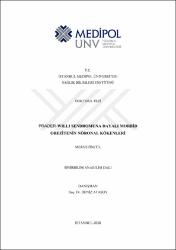| dc.contributor.advisor | Atasoy, Deniz | |
| dc.contributor.author | Öncül, Merve | |
| dc.date.accessioned | 2021-06-21T06:59:52Z | |
| dc.date.available | 2021-06-21T06:59:52Z | |
| dc.date.issued | 2018 | en_US |
| dc.date.submitted | 2018 | |
| dc.identifier.citation | Öncül, M. (2018). Prader-willi sendromuna dayalı morbid obezitenin nöronal kökenleri. (Yayınlanmamış doktora tezi). İstanbul Medipol Üniversitesi Sağlık Bilimleri Enstitüsü, İstanbul. | en_US |
| dc.identifier.uri | https://hdl.handle.net/20.500.12511/7231 | |
| dc.description.abstract | Prader-Willi sendromu (PWS) kromozom 15 in paternal kopyasındaki q11-q13 bölgesinin inaktive olması sonucu meydana gelen bir genetik nörogelişimsel bir hastalıktır. Magel2 geni, bu bölgede bulunan ve inaktive olan genlerden biridir. PWS, hiperfaji ve sosyal bozukluklar gibi çeşitli fizyolojik ve davranışsal problemler ile ilişkilidir. Magel2 nin hipotalamusta yüksek derece ifade edildiği bilinmektedir. Oksitosin, iştah ve besin alımını dizginleyerek tokluğu sağlayan başlıca nöropeptilerden biridir. PWS hastalarında yapılan postmortem analizler sonucu elde edilen bulgular oksitosin sentezleyen nöronların seviyelerinde ciddi miktarlarda azalmalar olduğunu göstermiştir. Bu bulgulara ilaveten oksitosin nöronlarının tokluk hissi oluşumunda oynadığı önemli rol de göz önüne alındığında, bu sistemdeki bozuklukların PWS hastalarında görülen aşırı iştaha katkıda bulunabileceği düşünülmektedir. Bu güne dek yapılan çalışmalar oksitosin nöropeptidinin gen ifadesi yada nöropeptidin post-translasyonel olgunlaşması aşamalarında yoğunlaşmıştir. Buna karşın sağlıklı ve PWS'li hayvan modellerinde, oksitosin nöronlarının içinde bulunduğu hipotalamik sinir ağlarının anatomisi ve fizyolojisi hakkında yapılan çalışmalar oldukça sınırlıdır. Bu projede hipotezimiz Magel2 geninin delesyonunun oksitosinerjik devre bozukluklarına PWS fenotipine yol açabileceğidir. Bu hipotezi test etmek amacıyla Magel2 eksik farelerde oksitosin nöronlarının fonksiyonel özelliklerini irdeledik. Çalışmalarımız sonunda oksitosin nöronlarına gelen sinaptik inputların Magel2 eksikliğinde dramatik bir şekilde değiştiğini ve bu nöronların aktivitesinin azaldığını gözlemledik. Bu çalışmalar hipotalamik sinir devrelerinde işlevi bozulan unsurların tanımlanmasına ve PWS'deki tokluk devrelerinin patogenezini anlamaya yardımcı olacaktır (*p < 0.05). | en_US |
| dc.description.abstract | Prader-Willi syndrome (PWS) is a genetic disorder caused by disruption of a well-defined region on chromosome 15, which contains several paternally active genes including Magel2. Insatiable appetite and the resulting morbid obesity is a significant problem in PWS. A constant desire to eat makes PWS the most common genetic cause of life threatening childhood obesity. The chromosomal abnormalities that underlie PWS leads to inactivation of several genes, a condition that is thought to cause hypothalamic dysfunction. PWS is associated with several physiological and behavioral problems including hyperphagia and social deficits. Oxytocin is an important neuropeptide for controlling satiety following food intake and also, it has been implicated in both social and feeding behaviours. The number of oxytocin neurons has been shown to be reduced in PWS patients as well as mouse models of PWS. Much of the research has been focused on the oxytocin neuropeptide and defects in its processing in PWS, however very little is known about the circuitry formed by oxytocin expressing neurons. Defects in satiety-circuits defined by oxytocin neurons may underlie the voracious appetite seen in PWS patients. Since Magel2 is highly expressed in hypothalamus, we hypothesized that its deletion may cause oxytocinergic circuit defects that may contribute to PWS phenotype. To understand full scope of oxytocinergic circuitry defects, we examined circuit properties of oxytocin neurons in Magel2 null mice, our results suggest that synaptic inputs to oxytocin neurons are dramatically altered that drive reduced activity in Magel2-deficient oxytocin neurons. These studies will help to identify dysfunctional circuit elements at synaptic resolution and elucidate pathogenesis of satiety circuits in PWS, which could lead to targeted therapeutic interventions to restrain insatiable hunger (*p < 0.05). | en_US |
| dc.language.iso | tur | en_US |
| dc.publisher | İstanbul Medipol Üniversitesi Sağlık Bilimleri Enstitüsü | en_US |
| dc.rights | info:eu-repo/semantics/openAccess | en_US |
| dc.subject | Prader-Willi Sendromu | en_US |
| dc.subject | Magel2 | en_US |
| dc.subject | Hipotalamus | en_US |
| dc.subject | Oksitosin | en_US |
| dc.subject | Prader-Willi Syndrome | en_US |
| dc.subject | Magel2 | en_US |
| dc.subject | Hypothalamus | en_US |
| dc.subject | Oxytocin | en_US |
| dc.title | Prader-willi sendromuna dayalı morbid obezitenin nöronal kökenleri | en_US |
| dc.title.alternative | Circuitry substrates of morbid obesity inprader-willi syndrome | en_US |
| dc.type | doctoralThesis | en_US |
| dc.department | İstanbul Medipol Üniversitesi, Sağlık Bilimleri Enstitüsü, Sinirbilim Ana Bilim Dalı | en_US |
| dc.relation.publicationcategory | Tez | en_US |


















